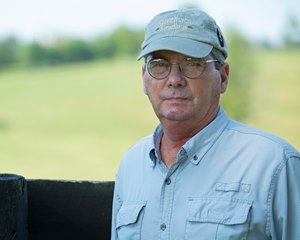Stonehaven's Marks Reflects on 50 Years With Horses


Colby Marks, the longtime farm and broodmare manager for Stonehaven Steadings, has officially retired from Thoroughbred breeding, at least full-time. Unofficially, he's still advising clients, because he can't imagine a life without horses.
Marks is responsible for assembling Stonehaven's select broodmare band that makes it one of the most successful boutique operations that prizes quality over quantity, boasting 18% stakes horses from runners.
Marks has had a hand in breeding or raising six champions: Ajdal, the 1997 champion sprinter in England; Zilzal, the 1989 Horse of the Year in England; and United States 2-year-old champion colts Fly So Free (1990), Arazi (1991), Shanghai Bobby (2012), and Corniche (2021).
In this week's MarketWatch Interview, Marks discusses his career, his racing family, and why he always valued pedigree above conformation.
MarketWatch: Why are you retiring now?
Colby Marks: I'm kind of physically tired as much as anything. You know, I've been doing this for a long time. My first horse job was when I was 16, so that was 50 years ago.
MW: How did you end up in the horse business?
CM: I grew up in a small town in Western Kentucky called Providence, about 40 miles south of Illinois. My uncle, George "Hoolie" Hudson, had a racing stable in those days and had a small farm with a training track on it. When I was a kid, I used to like to go out there and just be around the horses and whatnot, and I had broke Quarter Horses when I was young.
After high school, I ended up at the University of Kentucky and started working at the old Woodford Veterinary Clinic when I was in college and got an introduction to the Thoroughbred business. Then one thing led to another and I met Bruce Hundley of Saxony Farm. I went to work for Bruce in 1982 and I stayed there 22 years.
MW: How did you work your way up?
CM: When I went to work for Bruce I initially started working with yearlings and at the horse shows, showing horses, sales prep, and such. Then a few years later, I became farm manager and oversaw everything. In those days we had nearly 1,200 acres and 85 or 90 broodmares.
MW: Tell me about assembling the broodmare band for Stonehaven Steadings.
CM: After I left Bruce, I went to Woodspring Farm for Gary and Kathy Priest for a few years. Chiquita and Jeff Reddoch were up here visiting their daughter, Leah, who was in college at Midway, and they looked up my wife, Nancy, because Chiquita and my wife are actually from the same town in Louisiana. They said they had an interest in getting into the horse business. I think initially I bought five mares, and then they bought part of Saxony, and I went to work for them there.
One of the first mares we bought had a grade 2 winner and two other stakes winners. And the second or third year, we bought Steelin', the dam of Shanghai Bobby; she was carrying him when we bought her. And it just gradually grew until now; they have about 25 mares or so.
MW: In 50-plus years of working with horses, who were some favorites of yours?
CM: I had the good fortune of raising six champions and all those horses were kind of special from day one. I never was one that spent much time in the office; I was always on the farm. And if you get to be around them on a daily basis, those good ones are just different. They have a way and an air about them that other horses don't have. Shanghai Bobby was special from day one and he never had a bad day in his life.
MW: You're responsible for some pretty successful daughters of your own that have made names for themselves in horse racing. What can you tell me about your family?
CM: My first daughter, Linzay, is the marketing director at Lane's End, and our other daughter, Sarah, is an interior designer in Lexington and has worked on some of the rooms at Keeneland. They both grew up at Saxony with the horses and both are still very involved with them. My wife, Nancy, has a horse background from Louisiana. Her parents owned a bush track down there, in Eunice, in the '70s and '80s.
MW: What are you going to miss most in retirement?
CM: I will miss the horses, but I'm still going to be in contact with some. The Evanses, who own Corniche's dam, Wasted Tears, we've been friends for 40-something years and I'm still involved with them, just on a consulting basis. They have a few mares.

MW: When you were looking for broodmare prospects, was there anything that you valued more than others might have? Or anything about your approach that's different from your peers?
CM: If I see a pedigree I like that I think we can sell out of, and/or have a racehorse, I consider that more than I do conformation. I can give up conformation faults if I like the pedigree. But at the same time, I have to try to find an individual that I can live with. We never spent a lot of money on mares. We were trying to buy value; when you do that, you have to give up things in some places, but pedigree is the one thing that might reproduce itself.
